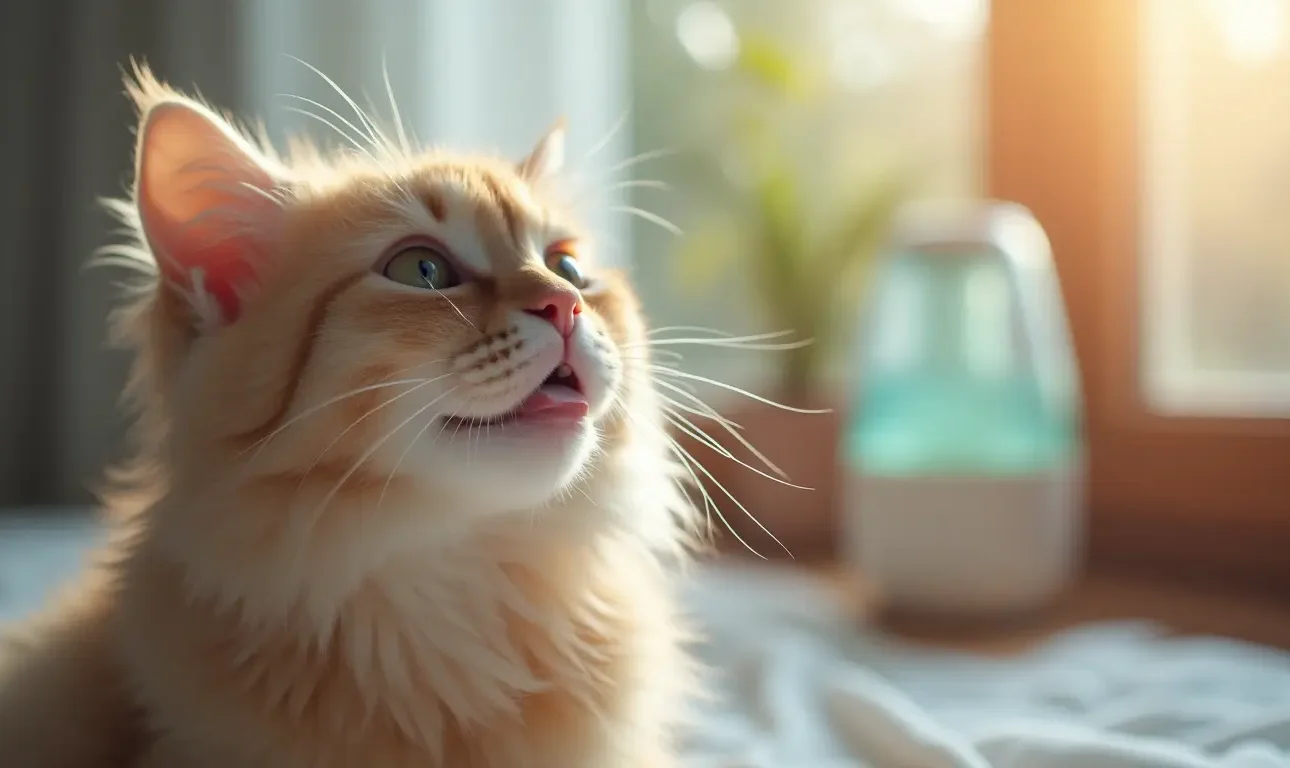As a cat owner, seeing your feline friend sneeze every now and then can be a little concerning, especially when you’re not sure whether it’s just a harmless reaction or something more serious. Sneezing is something we often associate with humans, but cats can sneeze too, and it’s a fairly common occurrence. While an occasional sneeze is typically nothing to worry about, repeated or persistent sneezing could be a sign of an underlying health issue.
In this blog post, we’ll explore the common causes of cat sneezing, what signs to look out for, and when it’s time to consult your vet. Understanding why your cat sneezes will help you determine whether it’s just a passing moment or something that requires medical attention. Let’s dive into the reasons behind cat sneezing and how to take care of your pet’s health!
Table of Contents
Common Causes of Cat Sneezing
Upper Respiratory Infections (URIs)
Upper respiratory infections (URIs) are one of the most common causes of sneezing in cats. URIs are viral or bacterial infections that affect a cat’s nose, throat, and sinuses. These infections are highly contagious, particularly in multi-cat households or shelters. The two most prevalent viral causes of URIs in cats are feline herpesvirus and feline calicivirus. These viruses can cause inflammation in the respiratory system, leading to symptoms like sneezing, nasal discharge, and coughing.
In addition to sneezing, cats with URIs often exhibit other signs such as watery eyes, lethargy, loss of appetite, and a general decline in their overall health. If your cat is sneezing frequently and showing these additional symptoms, it’s important to consult with a veterinarian for a proper diagnosis and treatment plan.
Allergies in Cats
Just like humans, cats can suffer from allergies, which may lead to sneezing. Common environmental allergens include pollen, dust, and smoke, all of which can irritate a cat’s sensitive respiratory system. When a cat comes into contact with these allergens, their immune system may react by triggering sneezing as a way to expel the irritants.
One type of allergy that frequently causes sneezing in cats is allergic rhinitis. This condition occurs when the nasal passages become inflamed due to an allergic reaction. If your cat’s sneezing seems to worsen at certain times of the year (e.g., during pollen season) or in specific environments, it could be due to allergens. To help reduce allergens in your home, consider using air purifiers, keeping your home well-ventilated, and regularly cleaning surfaces where dust and pet dander can accumulate.
Dental Issues and Sinus Problems
While dental health may not always be top of mind when considering sneezing, dental issues can sometimes contribute to sneezing in cats. This is especially true when dental disease leads to sinus pressure. The upper molars and premolars in cats are located close to their sinuses, so infection or inflammation in the teeth can result in sinus congestion and cause sneezing.
Signs that dental problems may be contributing to your cat’s sneezing include bad breath, difficulty eating, or swollen gums. If you notice any of these symptoms alongside sneezing, it’s a good idea to take your cat to the vet for a dental check-up. Early intervention can prevent further complications, such as the spread of infection to the sinuses or other parts of the body.
Foreign Objects in the Nose
Cats are naturally curious, and they may accidentally inhale small particles or foreign objects that can irritate their nasal passages. This can lead to sneezing as the body tries to expel the irritant. Common foreign objects that can cause sneezing include dust, pollen, and even small pieces of toys or food debris.
If your cat’s sneezing persists and is accompanied by other symptoms such as pawing at the face, nasal discharge, or difficulty breathing, it may be a sign that something is lodged in their nose. In these cases, it’s essential to visit the vet, who can perform an examination and safely remove any foreign object if necessary.
When Should You Be Concerned About Your Cat’s Sneezing?
1. Persistent or Frequent Sneezing
While an occasional sneeze here and there is perfectly normal, persistent or frequent sneezing can indicate a more serious underlying health problem. If your cat is sneezing continuously or if the sneezing lasts for weeks, it’s time to take a closer look at what might be going on. Chronic sneezing can be a sign of a feline viral infection (such as feline herpesvirus or feline calicivirus) or a bacterial infection that’s affecting your cat’s respiratory system. In these cases, the sneezing might not be the only symptom, and it could worsen over time if left untreated.
In addition, frequent sneezing may lead to nasal congestion, difficulty breathing, or other complications if the underlying cause is not addressed. If your cat’s sneezing persists for more than a few days or becomes more frequent, it’s a good idea to schedule a visit with your veterinarian for a thorough check-up and diagnosis.
2. Accompanying Symptoms
Sneezing is often accompanied by other symptoms that can help determine whether there is cause for concern. Nasal discharge, eye discharge, coughing, and a loss of appetite are all warning signs that something more serious might be at play. For example, if your cat’s sneezing is accompanied by thick, greenish nasal discharge, it could indicate a bacterial infection, which requires veterinary treatment. Eye discharge, especially if it’s watery or yellow, can be linked to viral infections or allergies.
A loss of appetite combined with sneezing could point to an underlying infection or a more severe health issue, such as upper respiratory disease. If you notice any of these symptoms in addition to sneezing, it’s important to get your cat checked by a vet as soon as possible to prevent further complications and ensure proper treatment.
3. Excessive Sneezing After a Change in Environment
Changes in your cat’s environment can sometimes trigger sneezing, particularly if your cat is exposed to new allergens or irritants. For instance, moving to a new home, introducing new furniture, or even using cleaning products or smoke can irritate your cat’s respiratory system, leading to excessive sneezing. Cats are sensitive to changes in their environment, and things like dust, chemicals, or even temperature fluctuations can cause sneezing as their body reacts to these irritants.
If you notice that your cat starts sneezing more after a significant change in their surroundings, it’s possible that environmental factors are the culprit. However, if the sneezing continues or worsens over time, it’s essential to rule out underlying health conditions. In these cases, consulting with your vet can help identify whether environmental triggers are to blame or if there’s another health issue contributing to the sneezing.
How to Treat and Manage Sneezing in Cats
1. Consulting a Veterinarian
When your cat’s sneezing becomes chronic or severe, it’s crucial to seek professional veterinary care. A veterinarian can accurately diagnose the root cause of the sneezing, whether it’s an upper respiratory infection, an allergy, or a more serious underlying condition. A professional diagnosis will allow you to determine the most effective course of treatment.
Depending on the cause, your vet may prescribe treatments such as antibiotics for bacterial infections, antivirals for viral infections, or nasal decongestants to help ease congestion and reduce sneezing. In some cases, if allergies are the cause, your vet may recommend antihistamines or other medications to manage the symptoms and prevent future sneezing episodes. It’s essential to follow your vet’s advice and complete the full course of any prescribed treatments to ensure your cat’s recovery.
2. Home Remedies and Comfort Measures
For mild sneezing or to provide additional comfort for your cat during recovery, there are several home remedies and comfort measures you can try. Keep your cat hydrated, as adequate water intake helps to thin mucus and make it easier for them to expel any irritants causing the sneezing. You can also use a humidifier in the room to add moisture to the air, which can help loosen nasal congestion and soothe irritated airways.
Some cat owners find success with steam baths—creating a steamy environment by running hot water in a bathroom and allowing your cat to inhale the moist air for a short time. Additionally, saline nasal drops can sometimes be used to flush out mucus, but it’s important to consult a vet before using any treatments at home to ensure they are safe and appropriate for your cat’s specific condition.
While home remedies can help alleviate symptoms, they should not replace professional veterinary care, especially if the sneezing persists or worsens.
3. Preventing Sneezing with Proper Cat Care
The best way to manage sneezing in the long term is through preventative care. Regular vet check-ups are essential for ensuring your cat’s health is monitored, and any potential issues are addressed before they become serious. Preventative measures also include keeping your cat’s environment clean and minimizing exposure to allergens. Regular dusting and vacuuming can reduce the buildup of dust, pet dander, and pollen that might trigger sneezing. You can also use air purifiers to help filter out allergens in the home.
Maintaining a healthy diet and providing supplements can boost your cat’s immune system and help them fight off infections that might lead to sneezing. Look for foods that are rich in essential nutrients like omega-3 fatty acids, antioxidants, and vitamins that promote overall health. Additionally, some vets may recommend supplements specifically designed to support the respiratory system, particularly if your cat is prone to frequent colds or infections.
By staying on top of your cat’s health with regular check-ups and creating a clean, allergen-free environment, you can help minimize sneezing episodes and improve your cat’s quality of life.
Conclusion
In conclusion, while occasional sneezing in cats is typically harmless, it’s important for cat owners to be aware of the potential underlying causes. Common reasons for sneezing include upper respiratory infections, allergies, dental issues, and even foreign objects in the nose. By monitoring your cat’s health closely and being aware of any additional symptoms, you can better determine when sneezing becomes a cause for concern.
If your cat’s sneezing is persistent, accompanied by other symptoms, or occurs after environmental changes, it’s always a good idea to consult with a veterinarian. Professional care will help identify any health issues and provide the necessary treatments to get your feline friend back to feeling their best.
FAQ: Cat Sneezing
1. Is it normal for my cat to sneeze?
Yes, occasional sneezing is quite normal in cats, just like it is in humans. It can happen for various reasons, such as a small irritant in their environment. However, if sneezing becomes frequent or lasts for an extended period, it’s important to look for other signs that could indicate an underlying health issue.
2. When should I be concerned about my cat’s sneezing?
You should be concerned if your cat’s sneezing persists for more than a few days, is frequent, or if it’s accompanied by additional symptoms like nasal discharge, eye discharge, coughing, or loss of appetite. These could indicate a respiratory infection or other health problems that need medical attention.
3. Can my cat’s sneezing be caused by allergies?
Yes, cats can suffer from allergies, and environmental allergens like pollen, dust, and smoke are common triggers for sneezing. If your cat’s sneezing occurs seasonally or in specific environments, allergies may be the cause. Discussing potential allergens with your vet can help manage these symptoms.
4. What treatments are available for a cat that keeps sneezing?
Treatment for a sneezing cat depends on the underlying cause. If the sneezing is due to a bacterial infection, your vet may prescribe antibiotics. Viral infections might require antivirals or supportive care. For allergies, antihistamines or environmental management can help. In any case, a veterinarian’s diagnosis is essential to ensure your cat receives the appropriate treatment.
5. How can I help my cat feel better if they’re sneezing a lot?
In addition to professional treatment, you can help your cat feel more comfortable by using a humidifier to add moisture to the air, offering them plenty of fresh water, and keeping their environment clean to reduce allergens. Steam baths can also help ease congestion. However, always check with your vet before trying any treatments at home.
6. Could my cat’s sneezing be caused by dental problems?
Yes, dental disease can sometimes contribute to sneezing, especially if the infection or inflammation spreads to the sinuses. If you notice your cat’s sneezing is accompanied by bad breath, swollen gums, or difficulty eating, it’s worth consulting your vet to check for dental issues that might be causing the sneezing.
7. Can environmental changes make my cat sneeze?
Yes, sudden changes in your cat’s environment—such as a new home, new furniture, or exposure to smoke or cleaning products—can trigger sneezing. Cats are sensitive to environmental changes, and these irritants can affect their respiratory system. Keep the air clean and free of dust, and try to limit exposure to potential allergens.
8. How can I prevent my cat from sneezing?
To prevent sneezing, ensure your cat has regular vet check-ups, maintain a clean environment by dusting and vacuuming frequently, and manage allergens in the home. A balanced diet and immune-boosting supplements can also help strengthen your cat’s overall health, reducing the likelihood of sneezing caused by infections.
9. Should I take my cat to the vet for sneezing?
If your cat’s sneezing is persistent, worsens, or is accompanied by concerning symptoms, it’s always a good idea to visit the vet. Early diagnosis can help prevent further complications and ensure your cat receives the right treatment.






